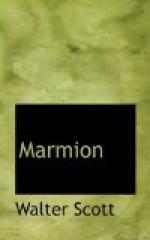INTRODUCTION TO CANTO SECOND.
The Rev. John Marriott, A. M., to whom this introductory poem is dedicated, was tutor to George Henry, Lord Scott, son of Charles, Earl of Dalkeith, afterwards fourth Duke of Buccleuch and sixth of Queensberry. Lord Scott died early, in 1808. Marriott, while still at Oxford, proved himself a capable poet, and Scott shewed his appreciation of him by including two of his ballads at the close of the ‘Minstrelsy of the Scottish Border.’ The concluding lines of this Introduction refer to Marriott’s ballads.
line 2. ’Ettrick Forest, now a range of mountainous sheep-walks, was anciently reserved for the pleasure of the royal chase. Since it was disparked, the wood has been, by degrees, almost totally destroyed, although, wherever protected from the sheep, copses soon arise without any planting. When the King hunted there, he often summoned the array of the country to meet and assist his sport. Thus, in 1528, James V “made proclamation to all lords, barons, gentlemen, landward-men, and freeholders, that they should compear at Edinburgh, with a month’s victuals, to pass with the King where he pleased, to danton the thieves of Tiviotdale, Annandale, Liddisdale, and other parts of that country; and also warned all gentlemen that had good dogs to bring them, that he might hunt in the said country as he pleased: The whilk the Earl of Argyle, the Earl of Huntley, the Earl of Athole, and so all the rest of the gentlemen of the Highland, did, and brought their hounds with them in like manner, to hunt with the King, as he pleased.
’"The second day of June the King past out of Edinburgh to the hunting, with many of the nobles and gentlemen of Scotland with him, to the number of twelve thousand men; and then past to Meggitland, and hounded and hawked all the country and bounds; that is to say, Crammat, Pappert-law, St. Mary-laws, Carlavirick, Chapel, Ewindoores, and Langhope. I heard say, he slew, in these bounds, eighteen score of harts.” -PITSCOTTIE’S History of Scotland, folio edition, p. 143.
’These huntings had, of course, a military character, and attendance upon them was part of the duty of a vassal. The act for abolishing ward or military tenures in Scotland, enumerates the services of hunting, hosting, watching and warding, as those which were in future to be illegal.’—Scott.
lines 5-11. Cp. Wordsworth’s ’Thorn’:—
’There is a Thorn—it
looks so old,
In truth, you’d
find it hard to say
How it could ever
have been young,
It looks so old
and grey.’
There is a special suggestion of antiquity in the wrinkled, lichen-covered thorn of a wintry landscape, and thus it is a fitting object to stir and sustain the poet’s tendency to note ‘chance and change’ and to lament the loss of the days that are no more. The exceeding appropriateness of this in a narrative poem dealing with departed habits and customs must be quite apparent. The thorn grows to a very great age, and many an unpretentious Scottish homestead receives a pathetic grace and dignity from the presence of its ancestral thorn-tree.




